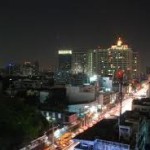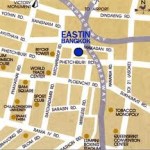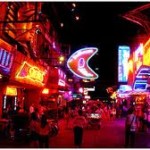A Writer Writes: Bill Preston (Thailand 1977-80) "In Search of Things Past: Wandering Bangkok Backstreets of Memory"
A Writer Writes
In Search of Things Past: Wandering Bangkok Backstreets of Memory
By Bill Preston (Thailand 1977-80)
The past is such a big place.
— Neil Young, Waging Heavy Peace
Having a day free to wander a city is one of life’s great pleasures, particularly one in a far-away place you came to know in youth and then lost to time. This past March, some thirty-five years on, it was both exciting and eerie to be walking again along Petchaburi Road in Bangkok, feeling a bit like Rip Van Winkle, in search of places from Peace Corps past.
I began by seeking out Petchaburi Soi 7, also known as Soi Surao–Mosque Lane–so named for the mosque near its entrance, one of many sois, or small lanes, abutting Petchaburi Road . . . .

Petchaburi Road
From 1978-1979, my friend Dan, a fellow volunteer from Thai 58, worked in Bangkok and lived off this soi. I was working upcountry then, teaching English and training teachers in Sukhothai and Phitsanuloke provinces, and would sometimes visit Bangkok. So it was that on several occasions I would walk down Soi Surao to stay at Dan’s unique apartment-one that gave new meaning to the term ‘railroad flat.’ His apartment was in fact an old caboose, one of two such red train cars that had been converted to, or perhaps had reincarnated as, apartments. Side by side, they occupied, incongruously, a small patch of land off the soi like some hidden, secret kingdom. The apartment, which Dan affectionately called the Loose Caboose, was remarkably small and narrow; it was difficult for two people to pass each other inside, and hardly allowed space to eat, sleep, or shower. But comfort was beside the point: Who else could clam to live in a caboose in the middle of Bangkok–Krung Thep: the city of angels . . . .
Wandering the soi now–past Darul Aman Mosque, shops and street vendors, dodging tuk-tuks and motorcycles–my revels of that magic time soon were ended. The old red caboose and its companion were gone without a trace, as seemingly insubstantial now as the baseless fabric of Prospero’s vision. For a split nanosecond I wondered if the Loose Caboose had ever existed-if, perhaps, it weren’t a figment of my aged imagination, a blind spot in my mind’s eye. Immediately, I dismissed this train of thought: All current evidence to the contrary, I knew it had. You had to have been there, and I had.
 Along another stretch of Petchaburi, down a different soi: another brush with impermanence. During my years as a volunteer in Thailand, the Peace Corps office was located at the end of Soi Somprasong 2, another lane running perpendicular to Petchaburi. Though that office had relocated long ago, I entered the soi again, now renamed Soi Somprasong 13, looking to recapture something-a memory? feeling? sensation?–of days long gone . . . .
Along another stretch of Petchaburi, down a different soi: another brush with impermanence. During my years as a volunteer in Thailand, the Peace Corps office was located at the end of Soi Somprasong 2, another lane running perpendicular to Petchaburi. Though that office had relocated long ago, I entered the soi again, now renamed Soi Somprasong 13, looking to recapture something-a memory? feeling? sensation?–of days long gone . . . .
Returning to Bangkok after months at our upcountry sites, many volunteers would stay at the Opera Hotel, just up the soi from the Peace Corps office. The Opera was a small oasis of relative calm and quiet-at once close to and far from the madding crowd of the surrounding city. More to the point, it was cheap, the rooms had air conditioning, and there was a swimming pool . . . .
As if to confirm the new number 13 an ill omen, there was no sign of the old hotel; where I thought it should be a large construction project was now in progress, perhaps a new hotel or condo soon to rise from the dust and debris where the Opera once stood. Like someone stood up on a date, I lingered . . . longing in vain to see, like some old flame, the Opera one last time . . . .
The Opera: with its dark, cool rooms and restaurant, where you could get a greasy cheeseburger delivered poolside while lounging on a chaise longue before or after visiting the Peace Corps office. Surely, this was an important part of what volunteerism was all about . . . .
But that was then; it was now March 2013: things change, nothing lasts. In Thailand of all places, I should have known: where Buddhism teaches that everything is impermanent and, as George Harrison reminds us, all things must pass . . . .
Back on Petchaburi Road, all was not lost. Bittersweet in my search of places past was the rediscovery of Rex Records, not far from Soi Somprasong 2. A fellow volunteer had assured me the old shop was still there, albeit not easy to pick out amid the general sensory overload of Petchaburi street life: “It’s there, you have to look for it,” Paul had insisted on the phone. Not unlike finding Waldo in one of those busy Where’s Waldo? drawings. He was right, and seeing Rex again after so many years was sweet. Here at last was one concrete connection to the past . . . .
For many Thailand volunteers in the 70s-and, no doubt, earlier and later-Rex Records was the shop we went to get cassettes of favorite music. This was long before iTunes, MP3s, and music downloads . . . in primordial times, before CDs and Sony Walkman personal cassette players. What we had then as portable music platforms were tape players-mine a small Sanyo I had picked up in Hong Kong. As a kind of ritual when in Bangkok, volunteers would go to Rex, rummage eagerly through its collection of vinyl albums, and then select music from various records, which the staff would record on cassettes. Back upcountry, we’d relish these recordings, almost like letters from home; indeed, they were a kind of correspondence–aural connections to home–along with those blue paper aerograms that, in the absence of email, you would cram full of scribbled news for folks back home, and then fold and seal by licking the glue on the top and side tabs, before sending on their snail-mail way . . . .
The bitter side of finding Rex was reading the sign on the door and window: “Close Shop End of April.” And the pain of recognition: The Rex’s  days were clearly numbered. Yet it seemed somehow auspicious, in a melancholy way, that I had a last chance to see the old shop again–almost as if it had been waiting for me to come along before closing its doors for good. Inside, the three Thai staff overseeing the Rex’s swansong were very young-about as young as I’d been in Peace Corps. They acknowledged that Rex had been around a long time and smiled when I mentioned how former staff used to make cassettes for me and other volunteers over 30 years ago. Now they were selling off the remaining stock-no albums or cassettes, but CDs, and DVDs. I rummaged the bins and bought a few, for old times’ sake.
days were clearly numbered. Yet it seemed somehow auspicious, in a melancholy way, that I had a last chance to see the old shop again–almost as if it had been waiting for me to come along before closing its doors for good. Inside, the three Thai staff overseeing the Rex’s swansong were very young-about as young as I’d been in Peace Corps. They acknowledged that Rex had been around a long time and smiled when I mentioned how former staff used to make cassettes for me and other volunteers over 30 years ago. Now they were selling off the remaining stock-no albums or cassettes, but CDs, and DVDs. I rummaged the bins and bought a few, for old times’ sake.
On Petchaburi Road again, after leaving the shop for the last time, I snapped some photos. A sentimental gesture perhaps, for old times’ sake. But then I didn’t want Rex to slip away as completely as the Loose Caboose and the Opera. Another thing: I hadn’t thought to take photos of those special places back in my Peace Corps days. When you are that young, you think everything — including yourself — will last forever.
•
Prior to Peace Corps, Bill worked as a community organizer in a VISTA project in Yonkers, New York, sponsored by the Westchester Legal Aid Society. Working with community residents, legal aid attorneys, the National Urban League, and the Department of Housing and Urban Development, a community committee contracted the late Jackie Robinson’s construction company to build new housing in an area of Yonkers slated for urban renewal. In the Peace Corps, he taught English and trained Thai secondary teachers of English in Yala, Sukhothai, and Phitsanuloke provinces. Extending for a third year, he trained Thai teachers in intensive English language seminars at the British Council in Bangkok. After Peace Corps, he worked for several months for the Joint Voluntary Agency in Nongkhai and Phanat Nikhom, interviewing Lao and Khmer refugees who were seeking asylum in the United States. After receiving an MA in English as a Second Language from the University of Hawaii at Manoa, he returned to Southeast Asia to work as an ESL supervisor, training teachers in a refugee camp in Galang, Indonesia. From 1986 until February 2013, he was an editor of ELT books and materials for various publishers, most recently for Cengage Learning in Singapore. He lives in Tenafly, New Jersey.
I much enjoyed this reminiscence of an earlier Bangkok. I just discovered the many charms of Thailand eight years ago. I have sometimes wondered what my life would have been like if in 1962 the Peace Corps had sent me to Thailand instead of Ethiopia.